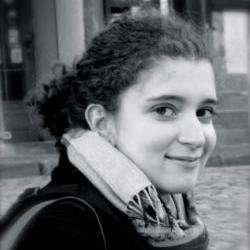Within the framework of a concert series entitled “Alexandre Tharaud domaine privé” (“Alexandre Tharaud’s Private Domain”) at the Cité de la Musique in Paris, the Luxembourg Philharmonic Orchestra and its musical director Emmanuel Krivine chose an eclectic program with three very different pieces showcasing the orchestra’s great abilities: J. Strauss II’s Tales from the Vienna Woods, Ravel’s Piano Concerto in G and Bartók’s Concerto for Orchestra. We travelled with them through Europe, from the Austrian woods to the Parisian cafés of the Belle Epoque, and to the Hungarian plains; from the time of crinolines to the Nazi invasions.
Strauss’ Tales from the Vienna Woods is a Viennese waltz with an unusual form: the waltz begins after a very long introduction featuring a solo zither, and ends with a undanceable rubato. The introduction sounds like a contemplation of the quiet, mysterious Vienna woods, and the principal theme is played by the zither – we are plunged into the first scenes of the film Sissi, set in Possenhofen Castle, or perhaps into the world of The Third Man and the ironically carefree tone of its zither-based soundtrack. The waltz begins and themes follow, smoothly linked together. Krivine did not excessively accentuate contrasts and rubatos, highlighting the composer’s inventiveness, both in melodies and in the orchestration. The orchestra gave a large scale to the sound, especially in the low register (thanks to the eight double basses and ten cellos), creating a real depth under the delicate melody. It is always truly enjoyable to be welcomed by a Viennese waltz in a concert – but this original piece, the sympathetic zither and Krivine’s refined interpretation were a great beginning to the evening.
We entered a quite different atmosphere with Ravel’s Piano Concerto in G: a lighter orchestra, virtuosic parts among the winds (already evoking Bartók’s next piece), fluid notes flowing from the piano and through the orchestra, and bright pianistic writing and modern ideas inspired by Stravinsky and Gershwin. Alexandre Tharaud is of course considered as a specialist in Ravel’s music – triumphantly welcomed on stage, he showed all his talent and sensitivity in this strange, complex score, in a fluent, natural way, without any exaggeration or affectation. As comfortable in the jazz style (first movement) as in the minimalist French melodic lines (second movement) or the virtuosity and humor of the finale, as if he could completely understand Ravel’s mind, he seemed to care little about the extreme technical difficulties. Actually, these difficulties seemed to be no problem for the orchestra either, despite the unbridled tempo chosen by Krivine in the Presto finale. Driven by a communicative enthusiasm, the musicians followed their conductor without any problem and the last piano chords triggered a thunder of applause: the Parisian audience loves Alexandre Tharaud, and knew it had just heard an exceptional concerto performance.
Bartók’s Concerto for Orchestra could be interpreted here as a synthesis of the two first pieces: a large orchestral force playing with huge technical precision, especially among the winds. These specificities make the concerto a perfect program for a tour: it’s a piece which can convince an audience of an orchestra’s technical and musical abilities – and that’s what happened with the Luxembourg Philharmonic. From the very beginning and the brass fanfares of the first movement, Emmanuel Krivine gave to his orchestra a broad energy that captivated the audience throughout the five movements. In the mischievous “Gioco delle coppie” (“Game of Pairs”), the wind instruments sang their duos one after the other, mixing their timbres and their moods. After this bouncy movement, the “Elegia” brought a heavy tension, supported by a large sound from the strings – this energy lasted till the very last sound in the movement... and suddenly disappeared when a noisy phone rang in the hall. The brass came back on stage, abruptly interrupting the sweet “Intermezzo” played by the woodwinds, and created a frightening atmosphere where the desks fought again each other, perfectly led despite the huge difficulty of the score. The last movement seems like an allegory of Hungary: a ride through the plains, folk dances, and deep enthusiasm make up this blusterous Finale. Krivine started with a ten-inch jump and never gave up till the last, brilliant major chord. Beyond tonalities and modes, in a complex rhythmical construction, the score brings each instrument in, and the musicians showed their talent for a last time: the orchestra finished the piece with an indomitable energy.
After large applause, Emmanuel Krivine came back to announce “something that would change the atmosphere”, adding “You’ll sleep better!” before conducing an elegant Slavonic Dance by Dvořák in A flat. The end of a wonderful concert.


